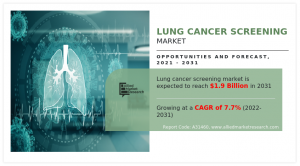The lung cancer screening market size is estimated to reach $1,853.04 million by 2031, growing at a CAGR of 7.7% from 2022 to 2031.
PORTLAND, OREGON, UNITED STATES, January 31, 2024 /EINPresswire.com/ -- 𝐈𝐧𝐭𝐫𝐨𝐝𝐮𝐜𝐭𝐢𝐨𝐧:
The lung cancer screening market size was valued at $879.59 million in 2021, and is estimated to reach $1,853.04 million by 2031, growing at a CAGR of 7.7% from 2022 to 2031.
The global lung cancer screening market has witnessed significant growth in recent years, driven by technological advancements, increasing awareness about early detection, and rising incidence of lung cancer worldwide. This article provides a comprehensive overview of the current state of the lung cancer screening market, key players, technological innovations, challenges, and future prospects.
𝑹𝒆𝒒𝒖𝒆𝒔𝒕 𝑹𝒆𝒑𝒐𝒓𝒕 𝑺𝒂𝒎𝒑𝒍𝒆 𝑪𝒐𝒑𝒚 𝒐𝒇 𝑹𝒆𝒑𝒐𝒓𝒕 - https://www.alliedmarketresearch.com/request-sample/A31460
Lung cancer remains a leading cause of cancer-related deaths globally, necessitating the development and adoption of effective screening methods. The market for lung cancer screening has evolved rapidly, with a focus on improving diagnostic accuracy and reducing the associated healthcare burden.
𝐊𝐞𝐲 𝐏𝐥𝐚𝐲𝐞𝐫𝐬:
Several prominent companies have played a pivotal role in shaping the lung cancer screening market. Companies such as
Eon Health
Canon Medical Systems Corporation
General Electric Incorporated (GE Healthcare)
Volpara Solutions Limited
Koninklijke Philips N.V.
FUJIFILM Holdings Corporation
Medtronic plc
Penrad Technologies Inc
Siemens AG (Siemens Healthineers AG)
Nuance Communications, Inc.
𝐓𝐞𝐜𝐡𝐧𝐨𝐥𝐨𝐠𝐢𝐜𝐚𝐥 𝐀𝐝𝐯𝐚𝐧𝐜𝐞𝐦𝐞𝐧𝐭𝐬:
Low-Dose Computed Tomography (LDCT): LDCT has emerged as a widely adopted screening method, allowing for the early detection of lung nodules. The technology offers high-resolution images while minimizing radiation exposure, making it a preferred choice for routine screening.
Artificial Intelligence (AI) Integration: AI has significantly enhanced the accuracy and efficiency of lung cancer screening. Machine learning algorithms analyze imaging data to identify subtle patterns and anomalies, aiding in early and precise detection.
Liquid Biopsy: Advancements in liquid biopsy technologies have enabled the detection of circulating tumor DNA in blood samples. This non-invasive method holds promise for early-stage lung cancer detection and monitoring treatment response.
𝐂𝐡𝐚𝐥𝐥𝐞𝐧𝐠𝐞𝐬:
Despite the progress made in lung cancer screening, challenges persist. Accessibility to advanced screening technologies, cost implications, and concerns related to false positives and overdiagnosis are among the key challenges faced by the market. Addressing these issues is crucial to ensuring widespread adoption and efficacy of lung cancer screening programs.
Future Prospects:
The future of the lung cancer screening market looks promising, with ongoing research and development efforts focused on improving screening methodologies and expanding accessibility. Integration of multi-modal approaches, such as combining imaging with biomarker analysis, is anticipated to further enhance diagnostic accuracy.
Conclusion:
The lung cancer screening market continues to evolve, driven by technological innovations, collaborations, and a growing emphasis on early detection. As the healthcare industry places a greater emphasis on preventive care, the role of advanced screening methods in reducing the burden of lung cancer is expected to grow. The ongoing commitment of industry leaders and the collaboration between stakeholders will play a pivotal role in shaping the future landscape of lung cancer screening.
David Correa
Allied Analytics LLP
+ +1 800-792-5285
email us here
Visit us on social media:
Facebook
Twitter
LinkedIn


